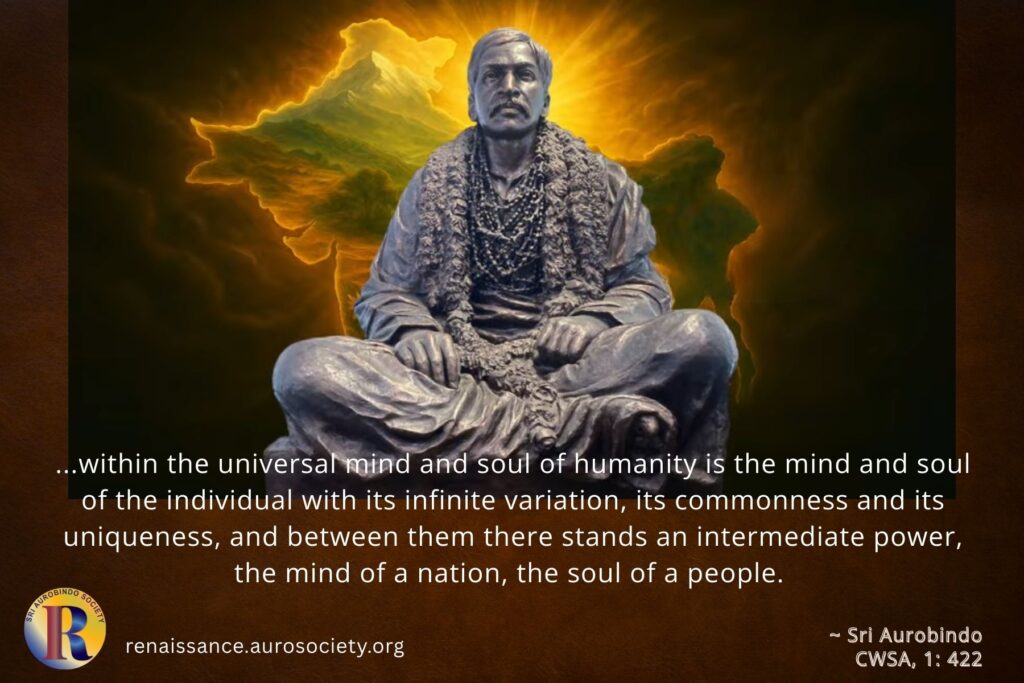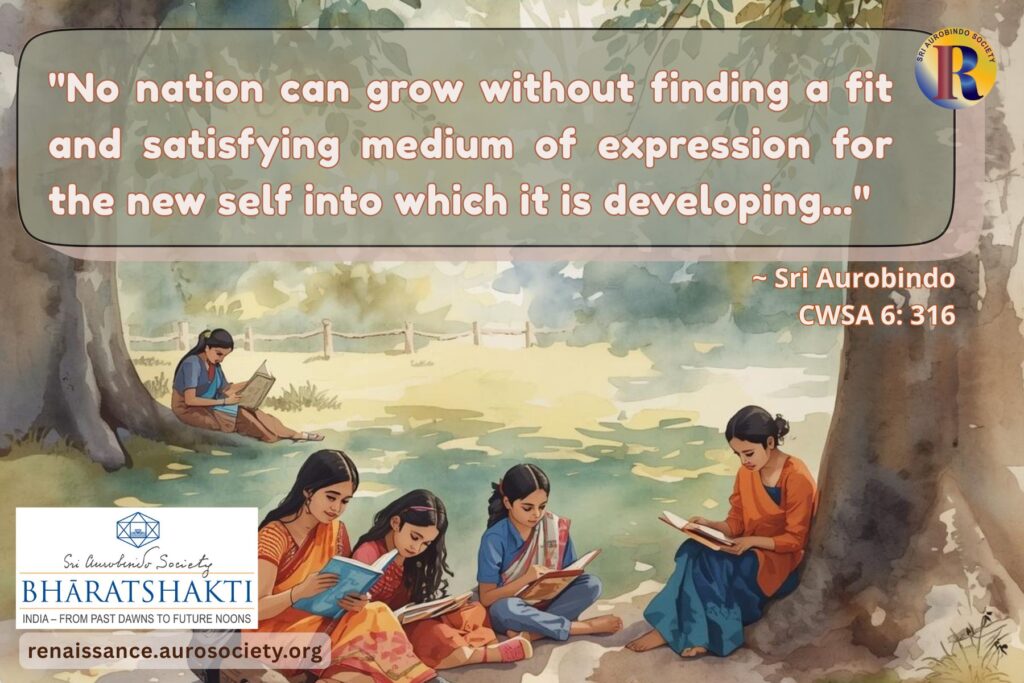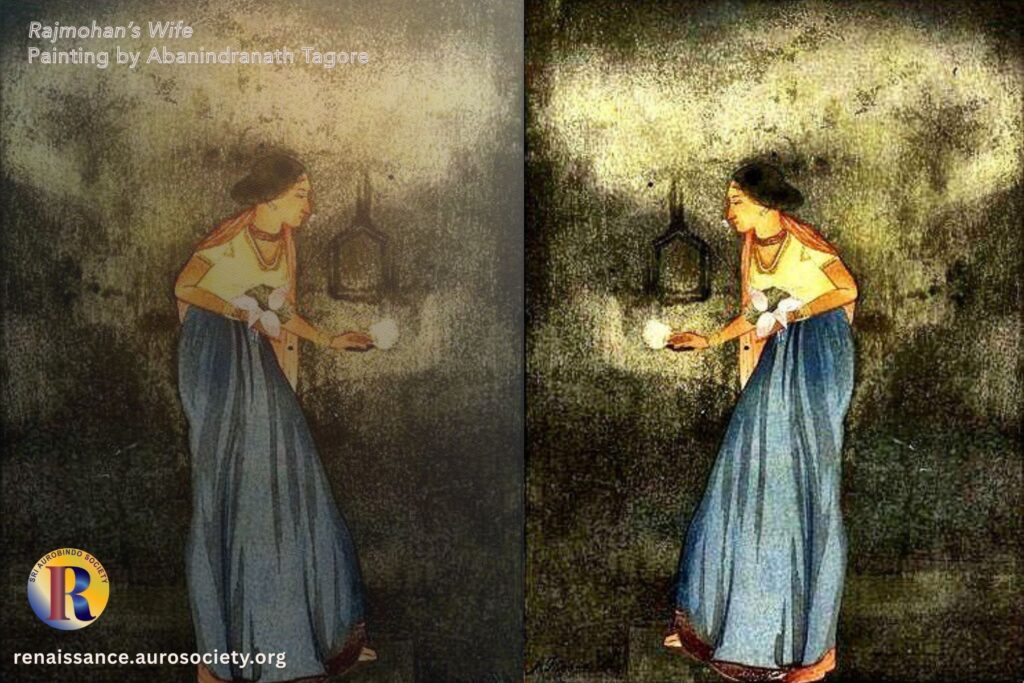Editor’s Note: The Mother shares some important advice on how to read Sri Aurobindo’s words. She says that if one sincerely aspires, one can get all answers from his potent words. Sri Aurobindo’s words are containers of spiritual forces. And that is why his words need to be read little by little and regularly with a silent mind so that they penetrate the depth of the being.
🌸🌸🌸
Read a little but regularly
Disciple: Sweet Mother, how should one read your books and the books of Sri Aurobindo so that they might enter into our consciousness instead of being understood only by the mind?
The Mother: To read my books is not difficult because they are written in the simplest language, almost the spoken language. To draw profit from them, it is enough to read with attention and concentration and an attitude of inner goodwill with the desire to receive and to live what is taught.
To read what Sri Aurobindo writes is more difficult because the expression is highly intellectual and the language is much more literary and philosophic.
The brain needs a preparation to be able truly to understand and generally a preparation takes time, unless one is specially gifted with an innate intuitive faculty. In any case, I advise always to read a little at a time, keeping the mind as tranquil as one can, without making an effort to understand, but keeping the head as silent as possible, and letting the force contained in what one reads enter deep within.
This force received in the calm and the silence will do its work of light and, if needed, will create in the brain the necessary cells for the understanding. Thus, when one re-reads the same thing some months later, one perceives that the thought expressed has become much more clear and close, and even sometimes altogether familiar.
It is preferable to read regularly, a little every day, and at a fixed hour if possible; this facilitates the brain-receptivity.
– The Mother (CWM, Vol. 12, p. 203)
***
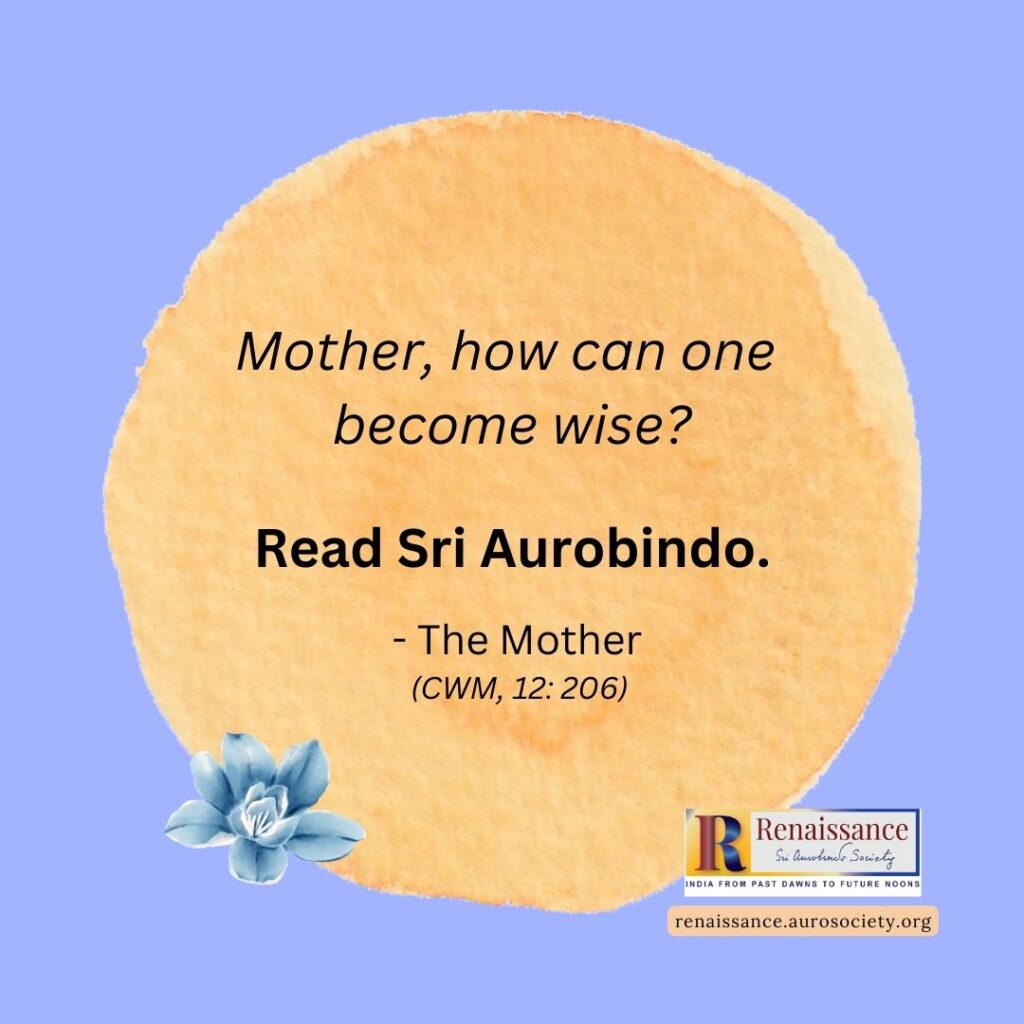
Read silently and patiently and allow his words to penetrate deep
In a general and almost absolute way, if you truly wish to profit from these readings, as from all of Sri Aurobindo’s writings, the best method is this: having gathered your consciousness and focused your attention on what you are reading, you must establish a minimum of mental tranquillity—the best thing would be to obtain perfect silence—and achieve a state of immobility of the mind, immobility of the brain, I might say, so that the attention becomes as still and immobile as a mirror, like the surface of absolutely still water. Then what one has read passes through the surface and penetrates deep into the being where it is received with a minimum of distortion.
Afterwards—sometimes long afterwards—it wells up again from the depths and manifests in the brain with its full power of comprehension, not as knowledge acquired from outside, but as a light one carried within.
In this way the faculty of understanding is at its highest, whereas if, while you read, the mind remains agitated and tries to understand at once what it is reading, you lose more than three-quarters of the force, the knowledge and the truth contained in the words.
And if you are able to refrain from asking questions until this process of absorption and inner awakening is completed, well, then you will find that you have far fewer questions to ask because you will have a better understanding of what you have read.
– The Mother (CWM, Vol. 10, p. 7)
***
You see, you are told something which you have never heard before; you listen, but it is incomprehensible, it does not penetrate into your head. But if you hear the same thing a second time, a little later, it makes sense. It is because the shock of the new idea has done a little work in the brain and prepared just what was necessary for understanding. And not only does it build itself up, but it perfects itself.
That is why if you read a difficult book, at the end of six months or a year you will understand it infinitely better than at the first reading and, at times, in a very different way. This work in the brain is done without the participation of your active consciousness.
– The Mother (CWM, Vol. 4, p.p 198-199)
***
If you want to understand a book with a deep teaching in it, you must be able to read it in the mind’s silence; you must wait and let the expression go deep inside you into the region where words are no more and from there come slowly back to your exterior consciousness and its surface understanding. But if you let the words jump at your external mind and try to adapt and adjust the two, you will have entirely missed their real sense and power.
There can be no perfect understanding unless you are in union with the unexpressed mind that is behind the centre of expression.
We spoke once of individual minds as worlds that are distinct and separate from one another; each is shut up in itself and has almost no direct point of contact with any other. But that is in the region of the inferior mind; there your own formations close you in; you cannot get out of them or out of yourself; you can understand only yourself and your own reflection in things.
But here in this higher region of the unexpressed mind and its purer altitudes you are free; when you enter there, you go out of yourself and penetrate into a universal mental plane.
There you can understand entirely what is going on in another and read his mind as if it were your own, because there no separation divides mind from mind. It is only when you unite in that region with others that you can understand them; otherwise you are not attuned, you do not touch, you have no means of knowing precisely what is happening in another mind than yours.
– The Mother (CWM, Vol. 3, p. 65)
***
Read:
“To read Savitri is indeed to practise Yoga.”
Interpreting and commenting on Sri Aurobindo’s words
And you must not jump to hasty conclusions. If we wait with patience, at the end of the chapter he will tell us—and tell us on a basis of irrefutable argument—why he has come to the conclusion he arrives at.
– The Mother (CWM, Vol. 9, p. 250)
***
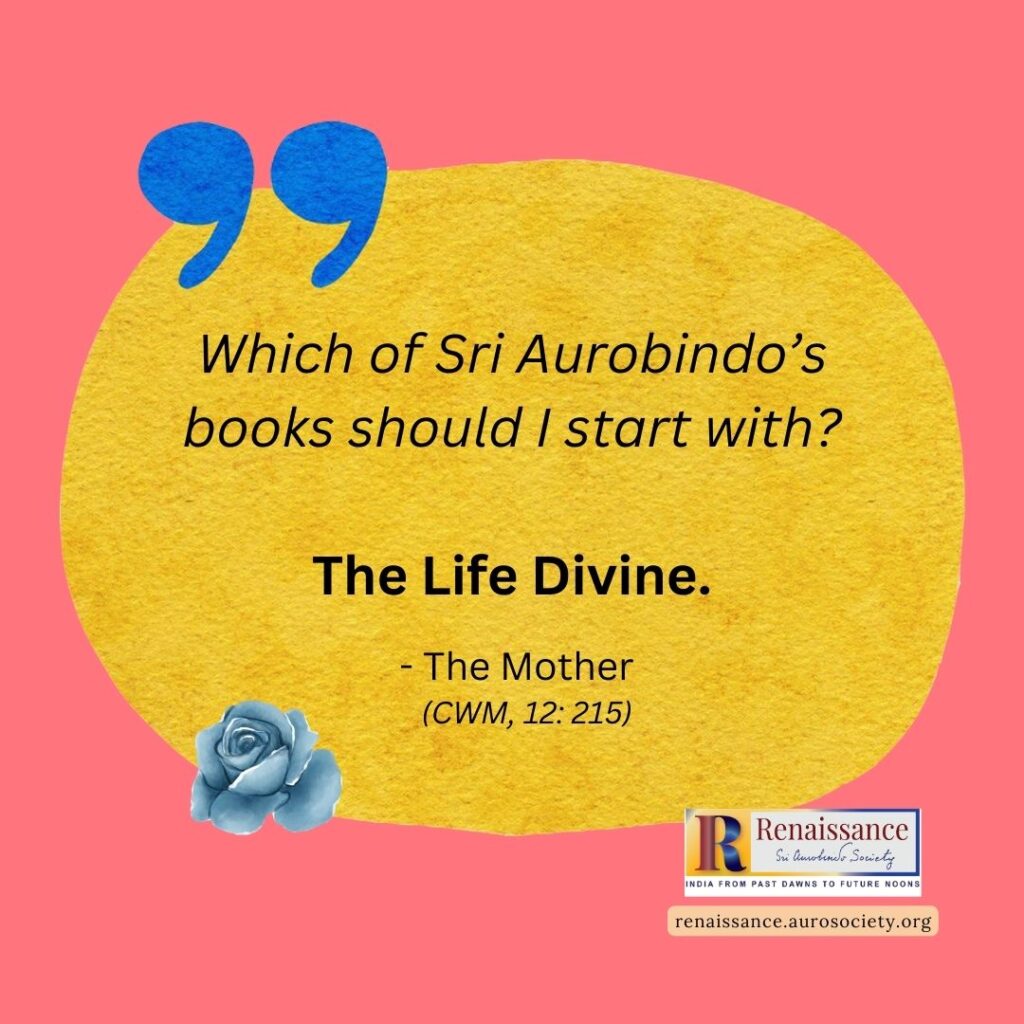
It is not by books that Sri Aurobindo ought to be studied but by subjects—what he has said on the Divine, on Unity, on religion, on evolution, on education, on self-perfection, on supermind, etc., etc.
– The Mother (CWM, Vol. 12, p. 206)
***
If you want to know what Sri Aurobindo has said on a given subject, you must at least read all he has written on that subject.
You will then see that he seems to have said the most contradictory things. But when one has read everything and understood a little, one sees that all the contradictions complement one another and are organised and unified in an integral synthesis.
– The Mother (CWM, Vol. 16, pp. 309-310)
***
But all language is a language of ignorance. Our entire way of expressing ourselves, everything we say and the way in which we say it, is necessarily ignorance.
And that is why it is so difficult to express something which is concretely true; this would require explanations which would themselves be full of falsehood, of course, or else extremely long. This is why Sri Aurobindo’s sentences are sometimes very long, precisely because he strives to escape from this ignorant language.
– The Mother (CWM, Vol. 10, p. 103)
***
(The Mother wrote out the following programme for a study group.)
1) Prayer (Sri Aurobindo, Mother—grant us your help in our endeavour to understand your teaching.)
2) Reading of Sri Aurobindo’s book.
3) A moment of silence.
4) One question can be put by whoever wants to put a question on what has been read.
5) Answer to the question.
6) No general discussion.
This is not the meeting of a group but simply a class for studying Sri Aurobindo’s books.
– The Mother (CWM, Vol. 12, pp. 215-216)
***
Disciple: Yesterday You said that in our Synthesis of Yoga class it is useless and even stupid to comment on Sri Aurobindo’s writings. Sweet Mother, I have been committing this stupidity in my classes for years. May I beg you to allow me to stop giving them?
The Mother: Many lazy-minded people are very happy to be given explanations about Sri Aurobindo’s books, because they have the feeling that they understand better. That is why I have not interfered. Indeed, it is better for people to hear readings and take interest in them than to have no contact at all with Sri Aurobindo’s writings.
So you should continue with the class; but in making comments, you must understand that they cannot avoid being inadequate, and that the original text far surpasses anything you can say about it.
– The Mother (CWM, Vol. 17, p. 338)
***
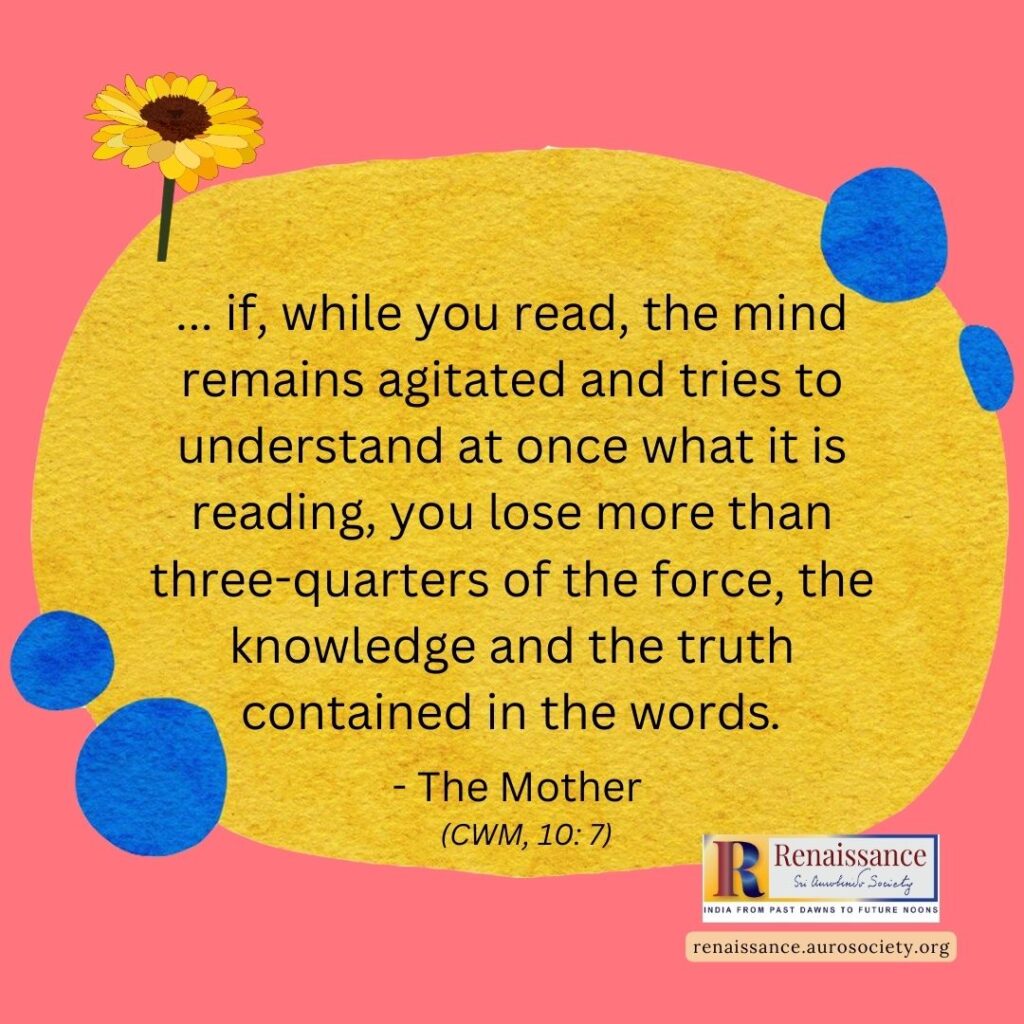
What I see in this Asram is that people catch hold of something said or written by the Mother, give it an interpretation other than or far beyond its true meaning and deduce from it a crudely extreme logical conclusion which is quite contrary to our knowledge and experience.
If we protest against these crude ideas being put upon us, the “disciples” cling to their own deductions and delusions and push aside our protests as inconsistent with what we have once said, insincere or unintelligible. The Mother has long ago given up trying to correct these things, for she finds that they do not listen to her but to something in their own minds which they follow and announce as hers. I still sometimes try, but with no great success.
As for the logical conclusion drawn—well! It is natural, I suppose, and part of the game. It is so much easier to come to vehement simple logical conclusions than to look at the truth as it is, many-sided and whole.
– Sri Aurobindo (CWSA, Vol. 32, pp. 111-112)
***
How to get answers from Sri Aurobindo’s books
Disciple: Once or twice, as a game, you took one of your books or Sri Aurobindo’s and opened a page at random, and read out a sentence. Can these sentences give one a sign or an indication? What should we do to get a true answer?
The Mother: Everybody can do it. It is done in this way: you concentrate. Now, it depends on what you want. If you have an inner problem and want the solution, you concentrate on this problem; if you want to know the condition you are in, which you are not aware of―if you want to get some light on the state you are in, you just come forward with simplicity and ask for the light.
Or else, quite simply, if you are curious to know what the invisible knowledge has to tell you, you remain silent and still for a moment and then open the book.
I always used to recommend taking a paper-knife, because it is thinner; while you are concentrated you insert it in the book and with the tip indicate something. Then, if you know how to concentrate, that is to say, if you really do it with an aspiration to have an answer, it always comes.
For, in books of this kind (Mother shows “The Synthesis of Yoga”), books of revelation, there is always an accumulation of forces―at least of higher mental forces, and most often of spiritual forces of the highest knowledge.
Every book, on account of the words it contains, is like a small accumulator of these forces. People don’t know this, for they don’t know how to make use of it, but it is so. In the same way, in every picture, photograph, there is an accumulation, a small accumulation representative of the force of the person whose picture it is, of his nature and, if he has powers, of his powers.
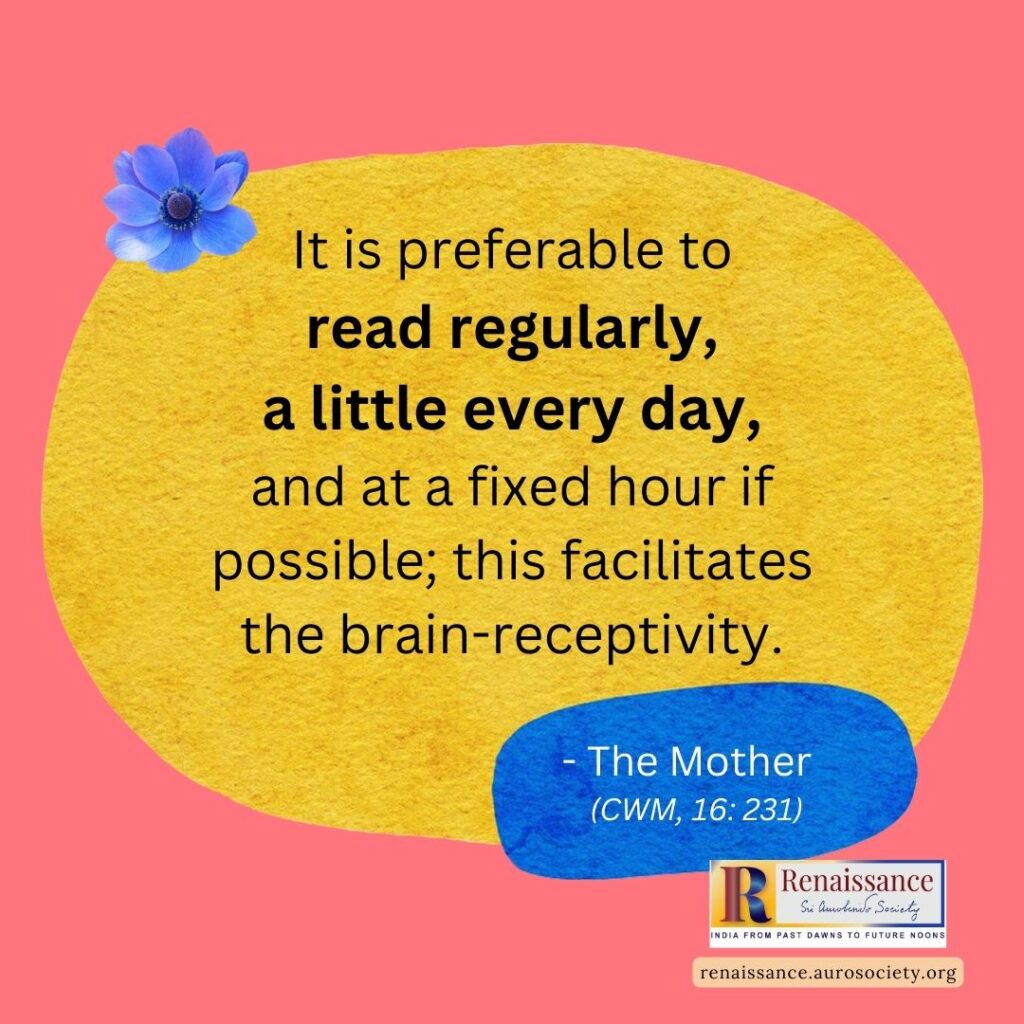
Now, you, when you are sincere and have an aspiration, you emanate a certain vibration, the vibration of your aspiration which goes and meets the corresponding force in the book, and it is a higher consciousness which gives you the answer.
Everything is contained potentially.
Each element of a whole potentially contains what is in the whole. It is a little difficult to explain, but you will understand with an example: when people want to practise magic, if they have a bit of nail or hair, it is enough for them, because within this, potentially, there is all that is in the being itself. And in a book there is potentially―not expressed, not manifest―the knowledge which is in the person who wrote the book.
Also Read:
Not to be a Sadhak of Books but of the Infinite
Thus, Sri Aurobindo represented a totality of comprehension and knowledge and power; and every one of his books is at once a symbol and a representation.
Every one of his books contains symbolically, potentially, what is in him. Therefore, if you concentrate on the book, you can, through the book, go back to the source. And even, by sing through the book, you will be able to receive much more than what is just in the book.
There is always a way of reading and understanding what one reads, which gives an answer to what you want. It is not just a chance or an amusement, nor is it a kind of diversion. You may do it just “like that”, and then nothing at all happens to you, you have no reply and it is not interesting.
But if you do it seriously, if seriously your aspiration tries to concentrate on this instrument―it is like a battery, isn’t it, which contains energies―if it tries to come into contact with the energy which is there and insists on having the answer to what it wants to know, well, naturally, the energy which is there―the union of the two forces, the force given out by you and that accumulated in the book―will guide your hand and your paper-knife or whatever you have; it will guide you exactly to the thing that expresses what you ought to know….
Obviously, if one does it without sincerity or conviction, nothing at all happens. If it is done sincerely, one gets an answer.
Certain books are like this, more powerfully charged than others; there are others where the result is less clear. But generally, books containing aphorisms and short sentences―not very long philosophical explanations, but rather things in a condensed and precise form―it is with these that one succeeds best.
Naturally, the value of the answer depends on the value of the spiritual force contained in the book.
If you take a novel, it will tell you nothing at all but stupidities. But if you take a book containing a condensation of forces―of knowledge or spiritual force or teaching power―you will receive your answer.
– The Mother (CWM, Vol. 8, pp. 162-164)
🌸🌸🌸
~ Design: Raamkumar

